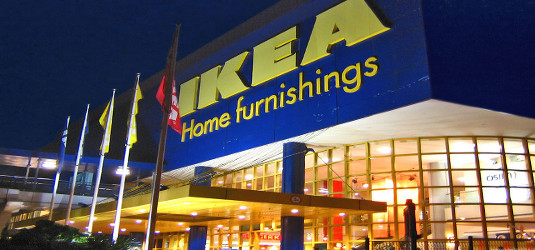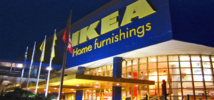February 12, 2016, the European parliamentary group " The Greens/European Free Alliance » published a report on the Swedish company’s tax efficiency. The politicians reported that the world's largest furniture and household goods retailer could "use a loophole in the legislation of various European countries, including the Netherlands, Belgium and Luxembourg, for tax evasion."
Ingvar Kamprad founded IKEA in Sweden in 1943, the first store opened in 1958. As stated in the report of the group, IKEA started to optimize its organizational structure in 1973. Then Kamprad created companies in the Netherlands Antilles (Curacao right now) and in Luxembourg, related to consolidation of assets linked with IKEA - "probably intellectual property," the document says.
In 1982, Kamprad divided IKEA into two legally separate corporate groups. The first joined teamed up structures of Inter IKEA (Luxembourg and Liechtenstein); second – IKEA’s structures with the parent company in the Netherlands. Above them - private foundations, owning two groups and monitored by Kamprad family, the report's authors wrote.
Inter IKEA Group owns assets IKEA’s "retail system" and the brand itself, and is also engaged in finance and real estate. The second group of assets "operates 328 IKEA stores in 28 countries under a franchising agreement with Inter IKEA group», tells the material.
According to the report's authors, one technique used by IKEA is transfer of royalty payments of every IKEA store to the Dutch unit serving as "conductor". "Royalties received in the Netherlands and from the Netherlands, settled in Liechtenstein (at least partially) without taxing" - said the group in the statement. 3% of revenue went on royalties. "From 1991 to 2014, Inter IKEA Group apparently used the Dutch intermediary company to avoid paying 84%-tax on 14.3 billion euros-royalty", - the report said.
In addition, the report indicated that the IKEA structure found yet another way to "transfer income" and avoid taxes through internal loans: it is allowed by the tax system in Luxembourg and Belgium.
IKEA said that the effective corporate income tax rate was approximately 19% for the last fiscal year (ended August 31, 2015), as reported by The Financial Times on February 12 (the company refused to comment). IKEA’s total revenue for the 2015 financial year amounted to EUR 32.7 billion (+ 11.5% YoY), and net profit - 3.5 billion euros.
Earlier, the European Commission has requested the Netherlands and Luxembourg to provide a fee of about 30 million euros from Starbucks and Fiat Chrysler Automobiles. At the end of 2015, the European Commission opened an investigation in connection with possible violations of tax by fast food chain McDonald's – the question was about the company’s fiscal operations in Luxembourg and royalties, the BBC reported. Before, similar checks were carried out in relation to the online retailer Amazon.
Ingvar Kamprad founded IKEA in Sweden in 1943, the first store opened in 1958. As stated in the report of the group, IKEA started to optimize its organizational structure in 1973. Then Kamprad created companies in the Netherlands Antilles (Curacao right now) and in Luxembourg, related to consolidation of assets linked with IKEA - "probably intellectual property," the document says.
In 1982, Kamprad divided IKEA into two legally separate corporate groups. The first joined teamed up structures of Inter IKEA (Luxembourg and Liechtenstein); second – IKEA’s structures with the parent company in the Netherlands. Above them - private foundations, owning two groups and monitored by Kamprad family, the report's authors wrote.
Inter IKEA Group owns assets IKEA’s "retail system" and the brand itself, and is also engaged in finance and real estate. The second group of assets "operates 328 IKEA stores in 28 countries under a franchising agreement with Inter IKEA group», tells the material.
According to the report's authors, one technique used by IKEA is transfer of royalty payments of every IKEA store to the Dutch unit serving as "conductor". "Royalties received in the Netherlands and from the Netherlands, settled in Liechtenstein (at least partially) without taxing" - said the group in the statement. 3% of revenue went on royalties. "From 1991 to 2014, Inter IKEA Group apparently used the Dutch intermediary company to avoid paying 84%-tax on 14.3 billion euros-royalty", - the report said.
In addition, the report indicated that the IKEA structure found yet another way to "transfer income" and avoid taxes through internal loans: it is allowed by the tax system in Luxembourg and Belgium.
IKEA said that the effective corporate income tax rate was approximately 19% for the last fiscal year (ended August 31, 2015), as reported by The Financial Times on February 12 (the company refused to comment). IKEA’s total revenue for the 2015 financial year amounted to EUR 32.7 billion (+ 11.5% YoY), and net profit - 3.5 billion euros.
Earlier, the European Commission has requested the Netherlands and Luxembourg to provide a fee of about 30 million euros from Starbucks and Fiat Chrysler Automobiles. At the end of 2015, the European Commission opened an investigation in connection with possible violations of tax by fast food chain McDonald's – the question was about the company’s fiscal operations in Luxembourg and royalties, the BBC reported. Before, similar checks were carried out in relation to the online retailer Amazon.



















